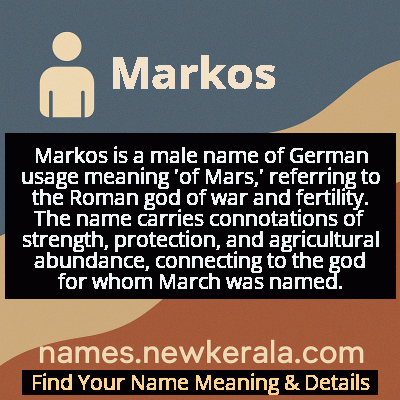Markos Name Meaning & Details
Origin, Popularity, Numerology Analysis & Name Meaning of Markos
Discover the origin, meaning, and cultural significance of the name MARKOS. Delve into its historical roots and explore the lasting impact it has had on communities and traditions.
Name
Markos
Gender
Male
Origin
German
Lucky Number
5
Meaning of the Name - Markos
Markos is a male name of German usage meaning 'of Mars,' referring to the Roman god of war and fertility. The name carries connotations of strength, protection, and agricultural abundance, connecting to the god for whom March was named.
Markos - Complete Numerology Analysis
Your Numerology Number
Based on Pythagorean Numerology System
Ruling Planet
Mercury
Positive Nature
Adventurous, dynamic, curious, and social.
Negative Traits
Restless, impatient, inconsistent, prone to indulgence.
Lucky Colours
Green, white.
Lucky Days
Wednesday.
Lucky Stones
Emerald.
Harmony Numbers
1, 3, 9.
Best Suited Professions
Sales, marketing, travel, entertainment.
What People Like About You
Versatility, charisma, adventurous spirit.
Famous People Named Markos
Markos Vamvakaris
Musician
Pioneering rebetiko musician and composer from Greece
Markos Botsaris
Military Leader
Souliot captain and hero of the Greek War of Independence
Markos Natsis
Politician
Greek politician and Member of the European Parliament
Name Variations & International Equivalents
Click on blue names to explore their detailed meanings. Gray names with will be available soon.
Cultural & Historical Significance
Throughout German history, variations like Markus have been common among nobility, scholars, and religious figures, symbolizing both intellectual and physical prowess. The name's persistence across centuries demonstrates its cultural resilience and adaptability. In modern German-speaking communities, Markos represents a bridge between classical tradition and contemporary identity, often chosen by parents who value historical continuity while seeking a distinctive name. The name's cross-cultural appeal has also made it popular in multicultural families, serving as a linguistic and cultural connector between different European traditions.
Extended Personality Analysis
Individuals named Markos are often perceived as strong-willed, determined, and protective, reflecting the martial origins of their name. They typically exhibit leadership qualities, confidence, and a natural ability to take charge in challenging situations. The fertility aspect of Mars also suggests creativity, growth-oriented thinking, and nurturing tendencies beneath their strong exterior. Markos personalities tend to be practical, grounded individuals who value tradition and stability while being innovative when necessary.
These individuals often demonstrate loyalty to family and community, with a strong sense of responsibility and honor. While they can be assertive and competitive, they also possess a caring nature that makes them reliable partners and friends who support others' growth and development. Their balanced approach to life allows them to be both decisive in action and considerate in relationships. The name suggests someone who combines traditional values with modern adaptability, making them effective in both personal and professional contexts. Their inherent strength is typically tempered with wisdom and emotional intelligence, creating well-rounded individuals respected for both their capabilities and their character.
Modern Usage & Popularity
In contemporary times, Markos maintains steady usage in German-speaking countries and Greek communities, though it's less common than its variations like Markus or Marco. The name enjoys particular popularity in Germany, Austria, and Switzerland, where classical names with historical significance remain valued. While not among the top-ranking names in recent decades, Markos continues to be chosen by parents seeking a name that blends traditional strength with distinctive character. Its usage has seen slight increases in multicultural urban centers where parents appreciate its cross-cultural appeal and classical roots. The name maintains a sophisticated, educated image while being accessible and easily pronounced across different languages, making it a practical choice for families with international connections or aspirations.
Symbolic & Spiritual Meanings
Symbolically, Markos represents the duality of strength and fertility, mirroring the Roman god Mars who governed both warfare and agriculture. The name embodies protection, courage, and the defense of what one values, while also symbolizing growth, abundance, and the nurturing of potential. It carries connotations of masculine energy channeled toward constructive purposes—both as a defender and as a cultivator. The March connection adds seasonal symbolism of renewal and new beginnings, representing the transition from winter's rest to spring's activity. Markos symbolizes the balance between assertive action and patient cultivation, between protecting existing values and fostering new growth, making it a name that represents comprehensive strength rather than mere physical power.

